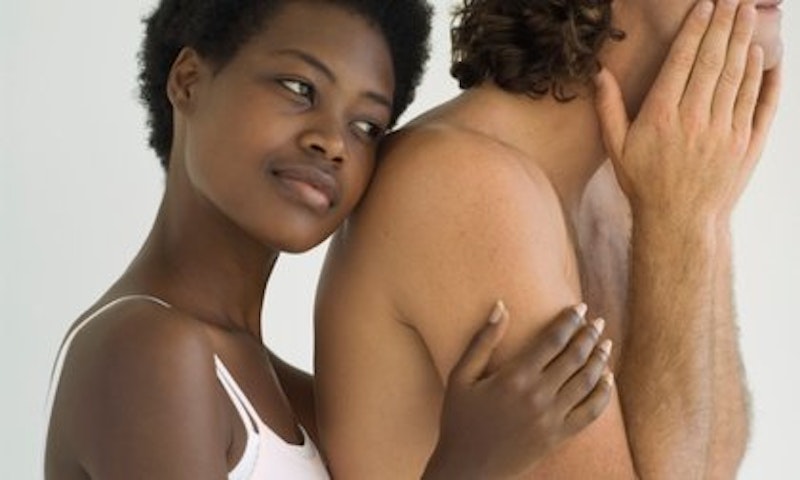I visited a black-and-white couple. I didn't know I was doing so until I actually got to the apartment; even then I had to have the fact pointed out. “You guys looking at the apartment too?” I said, addressing a pair of scrawny young men who stood in the bedroom hallway. “He's my boyfriend,” answered the black woman who had let me in.
I adjusted my gaze to take in woman and boyfriend: scrawny young white man there, African woman by the door. The woman was substantially larger than the man; not really big, but built wide and standing a few inches taller than her boyfriend. She had the softest eyes.
I didn't signal a moment of adjustment, an “Oh-kay.” I didn't do a false brightening of the eyes and an upward-inflected “Oh!” So I'm proud of myself. Of course, I'm proud if I can get through any social situation.
I looked around the apartment as the other visitors talked with the couple (something in French about the carpet). Eventually the visitors cleared out, and I asked the couple about noise and hot water, and then the woman told me about dealing with the janitor and the landlord. This was all in English, the two of them making a go of it out of politeness.
My gaze breaks quickly, so what I remember best about our talk is how easy it was to look them in the eye. Maybe because he was small and she was a black woman, and I feel less intimidated by people in those categories. Not to be cynical, but I know how my mind works. Also, we had shop talk in common, apartment stuff.
And we were speaking a special kind of English, the kind you talk with people who aren't at home in the language. I find it easier to talk that way. I can be direct and concise, and any sentence that gets from one party to the other counts as success. That takes some of the social pressure off.
It wasn't a big conversation. Only small things happened. At one point the woman introduced herself and her boyfriend. I remember making a point of extending my hand to her first, then to him. I think that, really, I was about to shake his hand first but caught myself and redirected. But I doubt that the couple themselves would have been much bothered either way.
At another point we were comparing backgrounds. I said I'd been in the city for 12 years, and the woman was about to say it was the same for her, but I kept going and made whatever point I had in mind—just a few words. Then I asked about what she had been going to say, and she said her piece. Actually I felt like we had things in common: politeness, time in the city.
I told them the word for klutz (when explaining why I wouldn't be doing small repairs myself), and they told me about cat hairs and the boyfriend's allergy. The woman made a joke about how she wanted to keep boyfriend and cat, so she vacuumed.
As I left, I asked about the drapes, and the woman said she had made them herself. I said I wouldn't be doing that; it must be nice to be able to. She smiled and seemed pleased.
I guess a lot of people younger than me wouldn't care too much about the couple's color. Yes, this matter-of-fact, race-blind contingent adds up to fewer people than we are supposed to believe. But even so there's plenty, much more than the old days. A tipping point is near, one where men marry each other, and small men stand next to large girlfriends, and you keep seeing light-tan little kids with hair that floats like seaweed spun from brown sugar. A lot of tight, useless knots in society's mental makeup are now relaxing and are about to come untied.
Life is going to be quieter and better, with fewer dumb things for people to fuss about. Anyway, that's the impression I got talking to the small boyfriend and the African woman and looking at her soft eyes.

